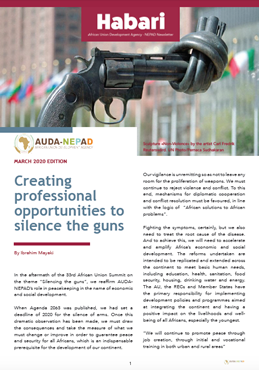Top stories
Creating professional opportunities to silence the guns
In the aftermath of the 33rd African Union Summit on the theme “Silencing the guns”, we reaffirm AUDA-NEPAD’s role in peacekeeping in the name of economic and social development.
When Agenda 2063 was published, we had set a deadline of 2020 for the silence of arms. Once this dramatic observation has been made, we must draw the consequences and take the measure of what we must change or improve in order to guarantee peace and security for all Africans, which is an indispensable prerequisite for the development of our continent. READ MORE>
Food Safety in Africa: An Important Deliverable for AUDA-NEPAD
Africa’s development priorities are spelled out in Agenda 2063— the blueprint for the African Union’s economic development in the coming decades. Specifically, Agenda 2063 identifies agricultural development as a high priority, as detailed in the Comprehensive Africa Agriculture Development Program (CAADP). This is further elaborated in the Malabo Declaration on Accelerated Agricultural Growth and Transformation for Shared Prosperity and Improved Livelihoods.
The Malabo Declaration (June 2014) specifies seven key commitments, including one on Boosting Intra-African Trade in Agricultural Commodities and Services. Further advanced by the launch of the African Continental Free Trade Area (AfCFTA) in March 2018, these commitments seek to harness market and trade opportunities locally, regionally, and internationally. READ MORE>
The Global Dilemma of Illicit Financial Flows: Time for Collective Action
Illicit financial flows (IFFs) has become a serious global threat to the attainment of the global development agenda. This has led the President of the United Nations General Assembly (PGA), Tijjani Muhammad-Bande, and the President of ECOSOC, Mona Juul to announce the high-level panel on international financial accountability, transparency, and integrity (FACTI) as a means to address this challenge that inhibits financing for Sustainable Development Goals.
It should be noted that Sustainable Development Goals (SDGs) are critical for the prosperity of people around the globe in the context of social, political and economic development aspects. However, the achievement of this global development agenda highly depends on the United Nations Member States’ capacity to mobilise resources to support and implement different development initiatives that target to achieve the Agenda 2030. READ MORE>
Giving ourselves a chance to make AFCFTA a success
AUDA-NEPAD and Frederick S. Pardee Center for International Futures (University of Denver) jointly publish a study on the conditions for successful implementation of the African Continental Free Trade Agreement. Here are the main findings.
Since the creation of the Continental African Free Trade Area (AfCFTA) endorsed at the African Union Summit in Niamey on July 7, 2019, we have been pushing forward the idea that a common market for and by Africans is possible and create a single market for goods and services to facilitate the free movement of people and investments and lay the foundations for a continental customs union. We continue to promote this economic integration among Heads of State and Government, emphasizing the sharing of economic benefits over historical rivalries and relative gains. READ MORE>
Update on the Gender Climate Change and Agriculture Support Programme: Focus on Malawi
The Gender Climate Change and Agriculture Support Programme (GCCASP) of the AUDA-NEPAD was designed to facilitate the implementation of regional and country level interventions to empower rural women and in particular smallholder women farmers to enhance their resilience so that they can better cope with the potential adverse impacts of climate change and enhance women’s economic empowerment and participation in the agriculture sector. The programme is being implemented in the five participating countries of Cameroon, Ethiopia, Malawi, Niger and Rwanda. READ MORE>
Featured Numbers in this month’s issue of Habari

